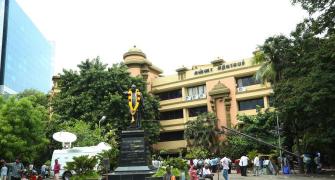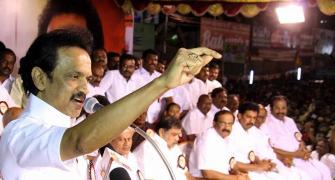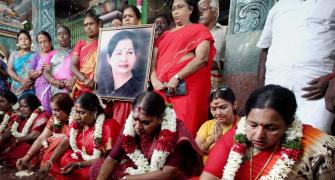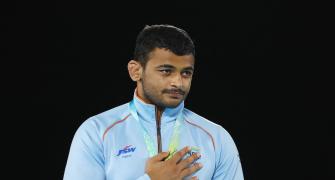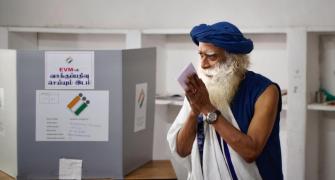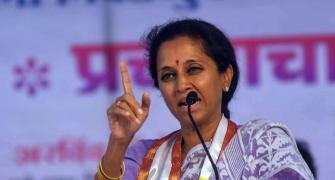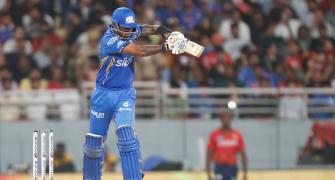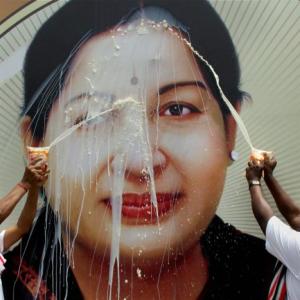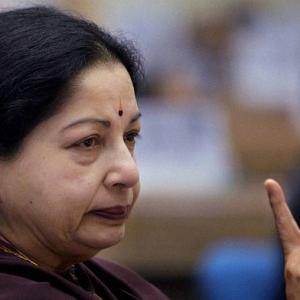 AIADMK’s Jayalalithaa won three assembly by-elections from her hospital bed. However, the DMK heir’s decision to disempower second-line satraps, who were running personal fiefdoms in their districts, and his fresh approach, could prove beneficial in the next polls, observes N Sathiya Moorthy.
AIADMK’s Jayalalithaa won three assembly by-elections from her hospital bed. However, the DMK heir’s decision to disempower second-line satraps, who were running personal fiefdoms in their districts, and his fresh approach, could prove beneficial in the next polls, observes N Sathiya Moorthy.

After her mentor, the late M G Ramachandran, Tamil Nadu’s Chief Minister Jayalalithaa has won three assembly by-elections from her hospital bed.
MGR had won the whole state in the assembly elections that had been advanced in his absence and without his knowledge even when he was chief minister. He did not know the election dates, nor was available to finalise poll alliances, seat-allocation or party candidates in 1984. The polls came after the Indira Gandhi assassination, and twin sympathy wave swept the All India Anna Dravida Munnetra Kazhagam-Congress alliance to power, both in the state and at the Centre.
Jaya's officially-attested B-Form symbol allocation papers had been filed by all three AIADMK candidates in Tiruparankundram, Thanjavur and Aravakuruchchi by-elections. Unlike MGR in1984, Jaya from her hospital bed did send a signed statement thanking the state’s people and party cadres, whose prayers, she said, had brought her back to life.
By then, the hospital authorities had come out in very clear terms about her ever-improving health conditions. They had also begun discussing the dates for shifting her from the coronary care unite to a special room, and later on to her home.
Post-results, Jaya also lost no time in writing to party cadres hailing their victory. The fact that state ministers, AIADMK legislators and other office-bearers worked as a team, as if she were overseeing them from her Poes Garden residence, made the results possible. It’s another matter that sectoral in-charges may face the music when the leadership begins analysing detailed results for chinks, if any.
Before MGR and Jayalalithaa, the only leader to have vowed to ‘win the elections from the hospital-bed’ was the late Congress president, K Kamaraj. Not only did the Congress party lose the state in 1967 -- never again to return to power since -- but Kamaraj himself lost his native Virudunagar seat, to a Dravida Munnetra Kazagham student leader, P Sreenivasan (who ended up in the Congress before his death).
The by-election to the Thiruparankundram constituency was necessitated by the AIADMK nominee, who had won the seat in May 16 assembly polls but did not live to see his victory being announced, owing to a heart attack. Polling for the other two seats was countermanded after the Election Commission took a serious note of money-play during the run-up to the polling, which however was reportedly not confined to Thanjavur and Aravakurichchi.
The DMK came a respectable second in all three constituencies, but the losing margins were not. Other third, fourth and/or fifth alternatives like the People’s Welfare Front were already divided and split, and actor-politician Vijaykanth’s Desiya Murpokku Dravida Kazhagam, which contested the by-polls on its own, bit the dust worse than in the May elections. The Ramadoss father and son combine, PMK, contested two of the three by-elections but lost equally badly as in May.
In Thanjavur and Aravakurichchi, the DMDK and the PMK got fewer votes than even NOTA. Though the BJP can have the puerile satisfaction of coming third in all three constituencies, the party lost its deposit in all of them.
It’s not unlikely that the party’s electoral theorists, both in Chennai and Delhi, could see light at the distant end of the tunnel, and could begin looking around for prospective allies and ‘winning faces’ for the state unit, way ahead of elections 2019 for the Lok Sabha.
Worse for the Bharatiya Janata Party is to explain the decision to contest the Tamil Nadu by-polls separately, but backing the AIADMK in the neighbouring Union territory of Puducherry where, in fact, Congress Chief Minister V Narayanaswamy won the Nellithope assembly by-polls against heavy odds, bagging thrice as much votes against the nearest rival.
The selective media-driven pressure now is, however, on DMK treasurer and heir-apparent M K Stalin, as this is the second successive defeat for the party under his care and leadership after the state assembly polls in May.
Yet, barring sections of the party’s ‘first family’, including supremo-father M Karunanidhi, the party’s second and lower-lines seem to be standing behind Stalin, after all. For, Karunanidhi too had lost a series of general elections and by-elections whether MGR or Jaya was on the other side.
There is general acceptance in the DMK that barring the twin AIADMK victories while in the Opposition in 1989, the ruling party alone has won by-elections in the state, over the last 25 years.
This includes the ‘Gummidipundi/Kancheepuram’ formula victories of the AIADMK under Jayalalithaa and ‘Thirumangalam/Madurai West’ sweeps by the DMK -- all while the respective parties were in power in the state.

While Stalin has to prove his greater acceptability vis-a-vis Jayalalithaa, DMK cadres say that the May elections, his ‘fresh-look’ approach could bring in first-time voters who were looking for ‘some change’.
To the cadres, Stalin’s older brother M K Azhagiri had deserted the party after he quit as Union minister under the United Progressive Alliance-II, and the DMK as the ruling party in the state too lost the 2011 assembly polls and later elections 2014. He was unreliable, or so many of them still think.
No ‘outsider’ alternative to Stalin is visible even in the distant horizon after Vaiko went on to form the rival MDMK way back in 1993. Rajya Sabha member and half-sister Kanimozhi and nephew-cum-ex-minister Dayanidhi Maran are all caught in 2G related court cases.
Cadres believe that the 2011 assembly poll defeat was mainly owing to the 2G scam and Karunanidhi’s inability to distance himself from those generally seen across the country as tainted party leaders.
Yet, disenchantment with Stalin’s leadership and style of functioning could emerge if he continues to fall back on family members like his father. Stalin’s wife Durga is said to be taking an extra interest in his politics and son-in-law Sabarisan was said to be managing his campaign affairs ahead of the May polls.
Stalin also began post the 2011 defeat by having fresh elections to the party organisation at all levels, to ‘disempower’ second-life satraps who were running personal fiefdoms in their districts, side-stepping and sidelining local inner-party competition and adversity.
It was uncharacteristic of the DMK traditions, where the ‘one-man-one-post’ rule had applied only to big boss Karunanidhi. And party ministers used to be accountable to the district unit secretaries, who used to be elected in most cases.
Where they had been ‘selected’, as was the case with a former district chief who quit politics to end up becoming a leading judicial officer in the country, the party and the leadership lost out, though not necessarily in that order.
With no major polls round the corner until 2019 -- barring the local body polls, whenever held after the courts cleared the processes -- Stalin would be expected to prove to the cadres that the men he ‘chose’ as district secretaries in some places could still be expected to deliver. More importantly, they would have to prove that they could carry the entire local party with them, and the whole hog.
If lower-level leaders fail to do it, and Stalin is unable to ensure as much (as Karunanidhi tended to overlook ever since becoming CM in 1996), disenchanted DMK elements at lower levels could gather critical mass and start looking for a larger face to take their message across to Stalin, or Karunanidhi -- or, even over them .
In such a situation, if an Azhagiri or Vaiko is not there, the situation could create one for the lower-level dissidents’ sake. If a Kanimozhi had not been empowered as yet within the party, then and then alone would this Kanimozhi or another in her place, could emerge. Not otherwise.
Then, and then alone, could even Karunanidhi carry weight with the cadres on withdrawing the current ‘expulsion’ order against Azhagiri and/or try and help Kanimozhi enlarge her support base within the party.
It’s another matter that outside of the party, the two are still seen as ‘Karunanidhi’s creations’, not an independent leader of his own making, which Stalin (alone) is in the DMK.
Others, if any, are all from outside the family and do not command the same reach and command as Stalin has been able to build up over the past decades, of course with father Kaurnanidhi’s blessings, but on his own, after Karunanidhi became wheel-chair bound, to the disregard of GenNext voters, what with his ideas and ideologies that are still in a distant past.
N Sathiya Moorthy, veteran journalist and political analyst, is Director, Observer Research Foundation, Chennai Chapter.

